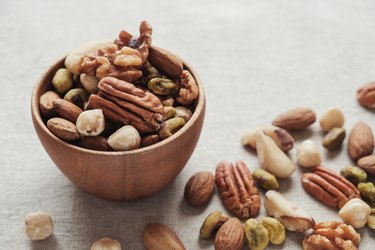
You snacked on some yogurt after lunch — and just when your spoon hit the bottom of the container, you realized that yesterday's expiration date was staring you in the face.
We've all been there, but what's comforting to know is that your snack hasn't magically gone bad overnight. And neither have those eggs you hard-boiled last week.
Video of the Day
We've all questioned food safety while looking through the refrigerator, wondering what to toss and what to keep in the seemingly vast wasteland of food. TheUSDAestimates that 30 to 40 percent of the food supply is thrown out asfood waste.That's roughly 133 billion pounds of food in one year — more than $160 billion annually.
However, you can put safety first, help cut down on food waste and eat more healthy, perishable foods. Let's take a look at some of our top healthy food picks and how long they generally last in the fridge.
Food |
Where to Store |
How Long They Keep Fresh |
Blueberries |
Crisper drawer in original packaging |
5 to 7 days |
Cabbage and cauliflower |
Crisper drawer |
7 days |
Leafy greens |
Crisper drawer |
5 days |
Eggs |
Original carton in the main body of the fridge |
Raw in-shell, 2 to 4 weeks; hard-boiled, 7 days |
Yogurt |
Original container |
1 month |
奶酪 |
Dairy drawer |
Soft cheeses, 1 to 2 weeks; hard cheeses, 1 month |
Root vegetables |
Refrigerator door |
2 weeks |
Cucumbers |
Crisper drawer |
7 days |
Nuts |
Fridge |
6 months |
Lettuce greens |
Crisper drawer |
7 days |
1. Blueberries
Blueberries keep fresh in the fridge for 5 to 7 days.
Berries, including blueberries and strawberries, are full of vitamins, minerals, antioxidants and dietary fiber. Many studies have linked berries to a range of health benefits such as better heart health, according toHarvard Health Publishing.
While blueberries can last a week in your fridge, strawberries and raspberries keep fresh in the fridge for just 3 to 5 days.
If you hauled home more berries than you can eat, simply rinse and store them in resealable plastic bags in the freezer (but if you're storing them in the fridge, rinse them only before you eat them to prevent mold). You can also lay berries out on a baking sheet to freeze prior to storing them in freezer bags, which will keep them from sticking together.
2. Cabbage and Cauliflower
Cabbage and cauliflower keep fresh in the fridge for 7 days.
Cabbage and cauliflower, broccoli and Brussels sprouts keep well and can be prepared in a variety of ways. They are part of thecruciferous family, along with other veggies like broccoli and Brussels sprouts, which can last 3 to 5 days in the fridge.
Cruciferous veggies are packed with beneficial nutrients, including dietary fiber and vitamins C and K.
3. Leafy Greens
Leafy greens keep fresh in the fridge for 5 days.
Leafy greens are nutrition powerhouses, containing large amounts of vitamins A, K, B6, C, as well as calcium, potassium, copper, manganese and fiber. There are manytypes of leafy greens, including kale, collard greens, mustard greens, spinach, and swiss chard.
A Hack to Keep Greens Fresh for Longer
Remove your greens from their original packaging, and cover the bottom of a plastic container (or the clamshell container the greens came in) with a paper towel. Put the greens back in and then lay another paper towel over them, closing the container. This will help keep the moisture out of the greens, which means they'll stay crisp for longer.
4. Eggs

Raw in-shell eggs keep fresh in the fridge for 2 to 4 weeks.
Hard-boiled eggs keep fresh in the fridge for 7 days.
鸡蛋是最afforda之一blenutrient-dense, lean proteinsources at 70 calories and just about 15 cents per egg. They are a nutrient-rich choice, with one large egg providing vitamin B12, riboflavin, biotin, iodine, selenium, choline, pantothenic acid and 6 grams of high-quality protein, according to theEgg Nutrition Center.
Eggs were once avoided and criticized for their cholesterol content. However, decades of scientific research has exonerated them. Recent recommendations from a Harvard study published in the January 2020 issue of theBMJand the2015-2020 Dietary Guidelines for Americansno longer limit cholesterol intake and include eggs as part of healthy eating patterns.
To keep them fresh, avoid storing eggs on the refrigerator door since they'll get exposed to warm air and become rancid quicker.
5. Yogurt
Yogurt keeps fresh in the fridge for 1 month.
Yogurt is a tasty and nutritious food that is full of beneficial bacteria that have numerous health benefits.
Research has shown that yogurt is associated with a decreased risk of type 2 diabetes, metabolic syndrome and heart disease, along with improved weight management, according to a December 2018 article inNutrition Review.
6. Cheese
Hard cheese keeps fresh in the fridge for 1 month, unopened.Cottage cheese: 1 weekCream cheese: 2 weeks
Dairy products are a nutrient-dense food: They provide necessary vitamins and minerals, including calcium, magnesium, potassium, and phosphorous, and can be a budget-friendly addition to your daily diet.
Even better, blocks ofhard cheeses like parmesan, cheddar, and manchego can last a month, sometimes even longer, in your refrigerator. A little goes a long way, so grate some and add it into your pasta, scrambled eggs or quesadilla.
7. Root Vegetables
Root veggies keep fresh in the fridge for 2 weeks.
Root vegetables, including beets, carrots, parsnips, radishes and turnips, are hardy vegetables that grow in the ground, stay fresh for a long time and have a range of culinary uses.
From raw to sautéed to roasted, it is easy to integrateroot vegetables into your daily meals.根菜类蔬菜是怒trient powerhouses, rich in complex carbohydrates, dietary fiber, antioxidants and vitamins A, B and C.
8. Cucumbers
Cucumbers keep fresh in the fridge for 7 days.
Fresh cucumbers are composed primarily of water, but pack a lot of nutritional value along with it. They are very low in calories but arerich in dietary fiber, vitamins A and C, and folic acid.
If you do not use an entire cucumber at once, wrap the remainder tightly in plastic or place it in a resealable bag or container to retain its freshness.
9. Nuts

Nuts keep fresh in the fridge for 6 months.
Nuts generally have a high fat content, so it is important to store them properly in order to protect them from becoming rancid.
In the refrigerator, nuts will stay fresh for six months, while in the freezer, they can be kept for up to one year. Nuts are protein-packed nutrition powerhouses, with a各种营养物质such as vitamin E, dietary fiber, potassium, magnesium and zinc.
10. Lettuce Greens
Lettuce greens keep fresh in the fridge for 7 days.
Lettuce greens, such as romaine, butter, loose-leaf and iceberg, are generally associated with salads. These low-calorie greens have a high water content and are good sources of nutrients like vitamin K.
Good quality lettuce is crisp, fresh and free of any appearance of decay. Lettuce should be washed and dried before storing it in the refrigerator to remove excess moisture. A salad spinner followed by patting with a towel is a great way to ensure the lettuce is properly dried.
Food Safety Tips to Remember
If you're concerned about whether your food is actually fresh enough to eat — or how to keep it fresh for longer in the first place — look to these savvy tips.
- When in doubt, throw it out.If you're just not sure and you think something looks different or smells spoiled, just be safe and throw it out.
- Label your food.Some painter's tape or masking tape can be your salvation. Simply label foods with the date and, in the case of leftovers, what it is, and you'll always know how old that container of berries or block of parmesan cheese may be.
- Don't bury perishable food in the back of the refrigerator.Keep foods that you know need to be eatentoward the front of the refrigeratorand, if possible, on the middle shelf in your line of sight. This way, you'll see them and will be more likely to eat them before they spoil.
- If you're not going to eat something in time, freeze it.This, of course, depends on the item. But many fresh or perishable items can be transferred to the freezer where they'll stay good for three to six months.
- Use your crisper drawers.Keeping produce in the crisper drawers can help extend its freshness by controlling the moisture levels.
- Read the package's dates.The"Use By," "Best By" and "Sell By" datesare an indication of peak quality, not a reflection of food safety. Some common food products and theiraverage consumable timeafter the expiration dates are:
- Yogurt: 5 to 7 days
- Eggs: 3 to 5 weeks
- Poultry and seafood: cook or freeze within 1 to 2 days
- Red meat and pork: cook or freeze within 3 days
- USDA: "Food Waste FAQs"
- Harvard Heath Publishing: Eat blueberries and strawberries three times per week
- Foodsafety.gov: "Cold Food Storage Chart"
- Egg Nutrition Center: "Nutrients in Eggs"
- BMJ: "Egg consumption and risk of cardiovascular disease: three large prospective US cohort studies, systematic review, and updated meta-analysis"
- USDA: DIETARY GUIDELINES FOR AMERICANS 2015-2020 EIGHTH EDITION
- Nutrition Review: "Yogurt and other fermented foods as sources of health-promoting bacteria"
- University of Nebraska-Lincoln: "Food Storage Chart for Cupboard/Pantry, Refrigerator and Freezer"
- USDA: "Food Product Dating"